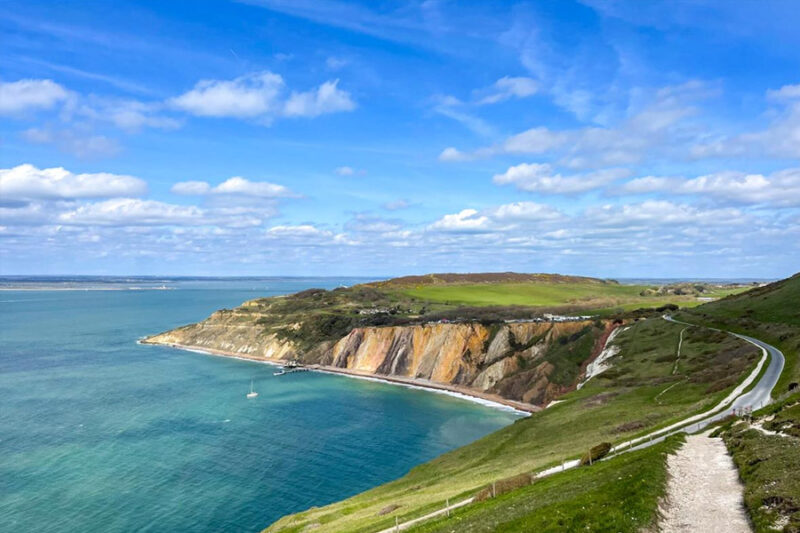Getting Across the Solent the Sustainable Way
Your eco-journey begins before the cliffs. Ferries to the Isle of Wight have quietly improved efficiency and emissions. Hybrid vessels like Victoria of Wight use battery power and conventional engines to reduce carbon emissions, and operators are increasing green tech.
Make your crossing work harder for the planet by stepping on as a foot passenger or rolling on with a bike. Off-peak sailings ease congestion and fuel burn, and carbon offsetting lets you balance the unavoidable emissions of a short sea hop. Think of the crossing as part of the adventure: wind in your hair on the sun deck, chalk downs drifting closer, a gentle reset into island time.
Stays That Put the Planet First
Sustainable island stays are a mild upgrade, not a compromise. Tapnell Farm in Yarmouth is a pioneer in solar power, water conservation, and zero-waste. Glamping domes and eco-pods offer creature comforts in a light-footprint design with broad skies and starry nights.
Just outside Newport, Tiny Homes Holidays nestles Scandinavian-style cabins in edible gardens, using locally sourced timber and solar power to keep everything humming. If you’re drawn to off-grid simplicity, Eco Retreats at Tom’s Eco Lodge pairs wood-burning stoves with composting loos, creating a cozy, earth-first refuge. Across the island, you’ll also find cottages with heat pumps, rainwater harvesting, and EV charging—easy indicators that your base is as kind to the landscape as it is to your sleep.
Move Light, See More
Island of Wight is designed for slow travel. Over 200 kilometres of cycle lanes and bridleways replace engine noise with bird and hedgerow sounds. Rent an e-bike from Route Fifty7 or Wight Cycle Hire and glide between beaches, villages, and views with gentle aid.
Walkers have a lifetime trail in a single loop: the 68-mile Coastal Path traces the island’s edge, stringing together hidden coves, chalk stacks, and wildflower cliffs. Public transport ties it all together with breezy ease. Southern Vectis runs low-emission “Breezer” open-top routes, sweeping you to The Needles, Ventnor Botanic Garden, and the high-downs panoramas. Paperless planning is simple—use the Island Line and Southern Vectis apps to time your connections and skip the printouts. When the sun dips, there’s nothing quite like an open-top ride as the sea turns bronze and the air smells of salt and gorse.
Eat Local, Eat Seasonal
Sustainability here tastes like fresh garlic butter, just-landed mackerel, and garden herbs still warm from the sun. The Garlic Farm in Newchurch is part food destination, part strollable landscape, with tastings and farm-to-table plates that respect the seasons. Ventnor Haven Fishery sells the day’s catch straight off the boats, no air miles, just tide and skill.
Monks farm organic fruit and raise pigs in tranquil gardens at Quarr Abbey. A tearoom sells handcrafted sweets for reflection. When dining out, The Seaview Hotel uses local ingredients with finesse, proving that excellent cuisine and sustainability can coexist. Green Tourism Award badges are a simple method to find restaurants that prioritise sustainability.
Shop Small, Buy Island-Made
Practical and gorgeous ceramics, sea-glass hues, crochet, and lively wood grain are here. At Arreton Barns Craft Village, glassblowers, blacksmiths, and potters modernise old techniques. Mermaid Gin from Isle of Wight Distillery comes in recycled glass bottles that celebrate coastal textures.
Markets in Newport and Ryde brim with local honey, cheeses, orchard fruit, and veg pulled from island soil. Beyond the stalls, look for refill stores and plastic-light packaging at independents—it’s easy to keep your footprint small when your purchases were born close by. Buying island-made reduces transport emissions and keeps your pounds dancing in the local economy.
Wild Places, Gentle Footprints
The island’s true luxury is space: wide beaches, chalk cliffs, heathland buzzing with bees, and rivers curling into quiet estuaries. Compton Bay turns golden at sunset, Newtown Creek hides waders and rare geese in its calm waters, and Yaverland Beach reveals fossils where sea and time have worked their patient magic.
Keep these places wild with simple etiquette. Stick to marked paths—coastal soils are fragile, and one shortcut can start a scar. Pack out everything, including “biodegradable” waste; nothing decays cleanly on a windswept path. Single-use plastics have no role in this landscape—carry a refillable bottle and top up at public refill points across the island. If you swim or paddle, use reef-safe sunscreen so marine life gets to thrive as much as you do. Near nesting birds, keep dogs leashed; the sand is their nursery.
Culture Goes Green
Beyond dunes and downs, the island hosts sustainable activities. Ventnor Fringe turns the town into a pedestrian cultural maze with intimate venues and low-impact logistics, while the Isle of Wight Festival includes extensive recycling and green travel collaborations. Green Island Festival features local music, sustainable energy, and exciting sustainability programs.
Smaller community gatherings often feature repair cafés, upcycling stalls, and locally brewed cider, creating a gentle loop where creativity, reuse, and good times meet. It’s an island-scale reminder that being green isn’t a box to tick—it’s a way to live well.
Give Back While You’re Here
If you like to leave places better than you found them, Isle of Wight voluntourism is rewarding and possible. Gift to Nature sponsors hands-on days to maintain walkways, meadows, and community greenspaces, while the Isle of Wight AONB organises beach cleans, habitat restoration, and citizen science surveys.
Even a few hours make a difference: pull a bag of litter from a shingle beach, help plant native species, or join a guided maintenance session on a popular trail. It turns a holiday into a small collaboration with the land—and gives you a story worth telling on the crossing back.
FAQ
Is the Isle of Wight easy to explore without a car?
Yes—buses are frequent, walking routes are exceptional, and e-bike hire covers the hills with minimal effort.
Can I bring an e-bike on the ferry?
You can, and foot passengers with bikes are welcomed; check your chosen sailing for any size or battery stipulations.
Where can I refill water bottles?
Public refill points are dotted around towns and seafronts, and many cafés happily refill bottles on request.
Are there eco-friendly places to stay year-round?
Absolutely—solar-powered cabins, glamping pods, and energy-efficient cottages operate in all seasons.
Which beaches are best for fossils?
Yaverland and the eastern reaches of Sandown Bay are famed for finds; follow local guidance and leave the cliff face undisturbed.
Do buses accept contactless payment?
Yes, most routes accept contactless, and mobile tickets via the app keep things paper-free.
How can visitors volunteer during short trips?
Join scheduled beach cleans or conservation days run by local groups, which often welcome drop-in help for a few hours.






